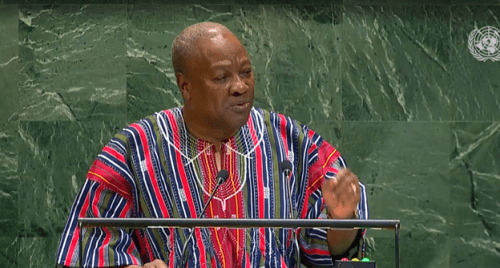African leaders delivered coordinated demands for reparative justice at the United Nations General Assembly, with Ghana’s President John Dramani Mahama announcing plans to introduce a formal motion recognizing the slave trade as “the greatest crime against humanity.”
Speaking at the 80th UN General Assembly session on September 25, 2025, President Mahama outlined Ghana’s intention to champion African reparations through concrete UN mechanisms. His address highlighted the displacement of over 12.5 million Africans during the transatlantic slave trade and subsequent wealth generation for Western nations.
“We must demand reparations for the enslavement of our people and the colonisation of our land that resulted in the theft of natural resources,” Mahama declared during his address to world leaders gathered in New York.
The Ghanaian leader serves as the African Union Champion for Reparations, a role that positions him at the forefront of continental efforts to secure compensation for historical injustices. His UN appearance represents the culmination of sustained advocacy that began with his appointment to this position earlier in 2025.
Mahama emphasized the historical paradox whereby Western governments compensated former slave owners for the loss of their “property” – the enslaved people themselves – while providing no redress to victims or their descendants. This point has become central to arguments for contemporary reparations initiatives.
The President’s announcement builds on Ghana’s established leadership in reparations advocacy, including the country’s implementation of the “Year of Return” initiative and ongoing efforts to attract diaspora engagement through heritage tourism and investment opportunities.
Central African Republic President Faustin Archange Touadera reinforced continental solidarity during his September 24 address, declaring that “the era of Africa’s dependence is over.” His speech called for fundamental restructuring of global relationships toward “sovereignty, not subordination; partnership, not exploitation.”
Touadera condemned persistent global inequalities, describing as “unacceptable” the reality that “poverty worsening in Africa while wealth accumulates in the Northern countries.” His remarks reflected broader African frustration with international economic structures perceived as perpetuating colonial-era extraction patterns.
The coordinated African position gained additional support from Latin American leadership. Bolivian President Luis Alberto Arce Catacora outlined specific mechanisms for addressing historical injustices through dedicated UN structures covering slavery, apartheid, genocide, and colonialism.
Arce proposed three core components for any reparations framework: financial reparations, environmental restoration, and restitution of stolen cultural property. He called for establishment of “effective mechanisms to restore historical justice” through proper international channels.
The Bolivian leader urged unity between the African Union and the Community of Latin American and Caribbean States (CELAC) in confronting colonialism’s lasting effects. His appeal reflected growing Global South cooperation on historical justice issues.
African leaders expressed disappointment with what they characterized as Global North reluctance to engage meaningfully on reparative justice. This frustration has prompted the shift toward formal UN mechanisms rather than relying on bilateral negotiations.
The timing of these coordinated statements suggests strategic positioning ahead of potential UN votes on reparations-related resolutions. Ghana’s announced motion will likely face significant opposition from Western nations historically opposed to formal reparations processes.
Previous UN discussions on slavery reparations have encountered resistance from former colonial powers who argue that contemporary governments cannot be held responsible for historical actions. However, African leaders counter that ongoing economic relationships perpetuate historical advantages and disadvantages.
The African Union has increasingly prioritized reparations advocacy as part of broader efforts to reshape international economic relationships. The 2025 Theme of the Year focuses specifically on “Justice for Africans and People of African Descent through reparations.”
Mahama’s approach emphasizes legal and moral arguments rather than purely political appeals. His reference to slavery as humanity’s greatest crime seeks to establish clear ethical foundations for reparations claims within international law frameworks.
The coordinated UN appearances represent escalation from previous advocacy efforts that relied primarily on regional forums and bilateral diplomatic channels. The shift to global platforms reflects African confidence in building broader international support.
However, implementation challenges remain significant. Western governments have consistently opposed binding reparations mechanisms, preferring development aid and trade preferences that maintain existing power structures while addressing some African concerns.
The reparations campaign also faces internal African challenges, including debates about distribution mechanisms and the relationship between reparations and ongoing development needs. Some critics argue that excessive focus on historical grievances diverts attention from contemporary challenges.
The success of Ghana’s proposed UN motion will depend partly on securing support from sympathetic non-African nations and effectively framing reparations as universal human rights issues rather than purely African concerns.
The African leaders’ UN statements reflect broader Global South efforts to challenge Western-dominated international institutions and create more equitable global governance structures. Reparations advocacy represents one component of this larger transformation agenda.
As the UN General Assembly session continues, attention will focus on whether formal reparations proposals gain sufficient support to advance through UN committees toward potential General Assembly votes in future sessions.
Source: newsghana.com.gh










